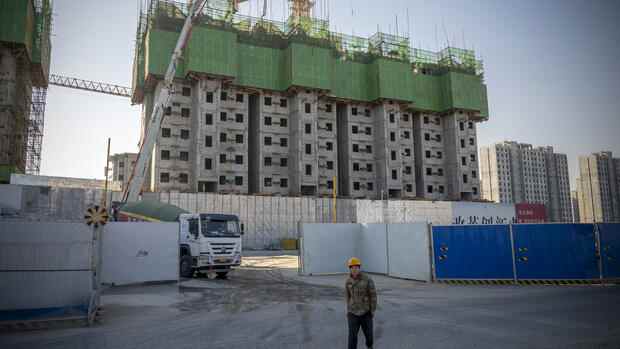Beijing China’s central bank cut key interest rates for the second time in eight days. With the rate hikes, the People’s Bank of China (PBoC) wants to support the ailing economy and counteract the ongoing crisis in the real estate market. However, experts doubt the effectiveness of the measures.
The interest rate cuts are a response to the ongoing problems in the Chinese economy. This is recovering more slowly than expected from the lockdown shock in April and May. Gross domestic product grew only minimally at 0.4 in the second quarter. After the June data initially pointed to a recovery, the latest economic data from July show that growth in the important areas of industrial production and consumption is weakening.
On Monday, the central bank lowered the interest rate for one-year loans (“loan prime rate”, or LPR for short) by five basis points to 3.65. Interest rates on five-year loans were reduced by 15 basis points to 4.30 percent. The PBoC last lowered the LPR, on which most new and outstanding loans are based, in January. The interest rate on five-year loans, to which most mortgage loans in China are tied, was last cut in May.
Last week, the central bank had already reduced the interest rate for one-year refinancing transactions with banks (“medium-term lending facility”, or MLF for short) by ten basis points to 2.75 percent. It also cut interest rates on seven-day reverse repurchase agreements from 2.1 percent to 2 percent.
Top jobs of the day
Find the best jobs now and
be notified by email.
Lu Ting, China chief economist at Japanese investment bank Nomura, described last week’s interest rate cut as “too little and too late”. The reduction in the key interest rate that has now taken place will “not do much to boost demand for credit”.
An assessment shared by Michael Pettis, finance professor at the renowned Peking University: companies and private households would not scale back their borrowing out of concern about a weak economy. “So the problem is not that capital is too expensive, but the lack of domestic demand,” says Pettis.
Real estate crisis inhibits economic growth
In addition to the ongoing uncertainty about further lockdowns as a result of the strict zero-Covid policy, the Chinese real estate crisis is causing uncertainty among companies and households. “The comparatively large cut in the five-year interest rate that has now taken place suggests that the PBoC is particularly concerned about the problems in the housing market,” Sheana Yue, China economist at Capital Economics, told the Hong Kong newspaper South China Morning Post.
The crisis on the real estate market, which has directly and indirectly contributed up to a third to economic growth in recent years, has recently intensified. Measured in terms of square meters, the sale of residential real estate fell by more than 27 percent in the first half of the year compared to the same period last year. In addition, prices have recently fallen both for new buildings and on the secondary market. In particular, an impending loss in value of existing properties could lead to a domino effect.
According to estimates, around three quarters of private household assets are in real estate. If they lose confidence in real estate as a value-preserving asset class, this could lead to rising home sales and a negative price spiral on the secondary market. This is also likely to have a negative impact on demand for new builds.
The financial problems of numerous property developers also contribute to the loss of confidence. The financial difficulties at Evergrande and Co. mean that numerous construction projects have come to a standstill. Tens of thousands of homebuyers have threatened to stop their mortgage payments until construction of their homes resumes.
>> Read also: “Who has my money?”: Property buyers in China are on strike, politicians are alarmed
By lowering the interest rate on five-year loans, the aim is to “relieve the burden on borrowers,” said Iris Pang, chief economist for Greater China at ING Bank. At the same time, some local governments have started granting loans to developers to continue building unfinished houses. Both measures together could “reduce the concerns of existing mortgage borrowers,” according to the expert. She expects there will be at least one more rate cut on five-year loans this year.
If the real estate market sees progress in building unfinished projects, sentiment could improve and prices should stabilize, Pang said. Potential buyers could then consider buying their own homes or upgrading existing properties. However, the expert does not expect the first signs of such an improvement until the fourth quarter at the earliest.
More: Handelsblatt-Today: Economic crisis in China: the end of the growth miracle?
